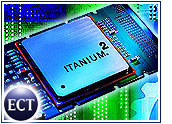
Open source technology is cheap to use, comes with few frills — and has yet to gain the popularity enjoyed by proprietary products from giants like Microsoft.
Nevertheless, many companies are taking advantage of open source offerings’ flexibility and low cost for use in e-business operations.
“We read most about Linux in the open source world,” Yankee Group senior analyst Rob Perry told the E-Commerce Times. “[And] the Apache HTTP server is a very widely used Web server.”
Perry noted that Apache is embedded in many application servers, including a large number of corporate Web sites. Such open-source programs have helped many businesses, especially small companies, establish a Web presence without emptying their bank account.
Big and Small Users
Experts also pointed to wide use of MySQL, an internal database server deployed at high-profile companies and agencies including Yahoo, Texas Instruments, Motorola, Silicon Graphics and NASA.
In some cases, large numbers of users are taking advantage of open source and do not know it. For example, many e-mail servers are based on open source technology.
Giga Information Group vice president Andrew Bartels noted that the developers of Netscape, which lost the browser war years ago to Microsoft’s Internet Explorer, have released the guts of their program as Mozilla, which is used as an open source underpinning for numerous Web sites.
Despite open source software’s reputation for being “free,” Perry said “cheap” is a more accurate descriptor for such products’ cost advantage in business settings.
“I don’t believe software is ever free, since there’s a different level of internal support required to run open source,” Perry noted.
But for businesses that have the time and technical resources to learn to use it, analysts said, open source software is attractive at the infrastructure level.
Expertise, Flexibility Issues
For example, such software can be deployed on any UNIX server system. In contrast, Microsoft’s Internet Information Server software, as well as other proprietary programs, can be used only on Windows-based servers.
“You can get the scale of UNIX or Linux with more hardware independence, no dependence on Microsoft and at a lower cost, particularly if you have the expertise to deal with open source,” Perry said.
While open source programs are considered easier to update than proprietary software — and while open source proponents claim their programs can be made more secure — a key factor slowing the technology’s adoption is a lack of know-how to employ it effectively.
“Open source products are best deployed when users are highly technical in their knowledge,” Gartner research director Mark Driver told the E-Commerce Times.
Best for Infrastructure
In e-commerce settings, Driver said, open source tends to be deployed mostly at the infrastructure level and for serving basic content Web pages. Giga’s Bartels noted that such software is not yet widely used to process transactions in which personal information is exchanged.
Attempts to introduce end-user open source products, such as Sun Microsystems’ StarOffice suite, have met with a disappointing reception from the business community, Driver added.
Despite its inability to unseat Microsoft in the consumer applications arena, Driver said open source retains a sizable presence in the infrastructure sector. It also is being helped by efforts from industry heavyweights IBM and HP, which have introduced products and services that support open source development.
“It’s well positioned at this point and should remain strong at the infrastructure level,” Driver said.
Open source’s corporate market share has long been a disputed topic. Various industry estimates, for example, have placed Linux server market share anywhere between 10 and 35 percent.
Solid Presence
Giga’s Bartels said a fervent following and the support of major companies ensure that open source will have a place in e-business for the foreseeable future. He noted, however, that such technology’s status could be enhanced by performance benchmarks that attest to uniform quality standards.
The Yankee Group’s Perry said open source software could prove worthwhile for e-businesses if they can embrace General Public License (GPL) requirements, which state that new contributions to the code must be shared with the community at large.
“If commerce is your business, not software, you don’t have a problem with that,” Perry said.






















































Social Media
See all Social Media